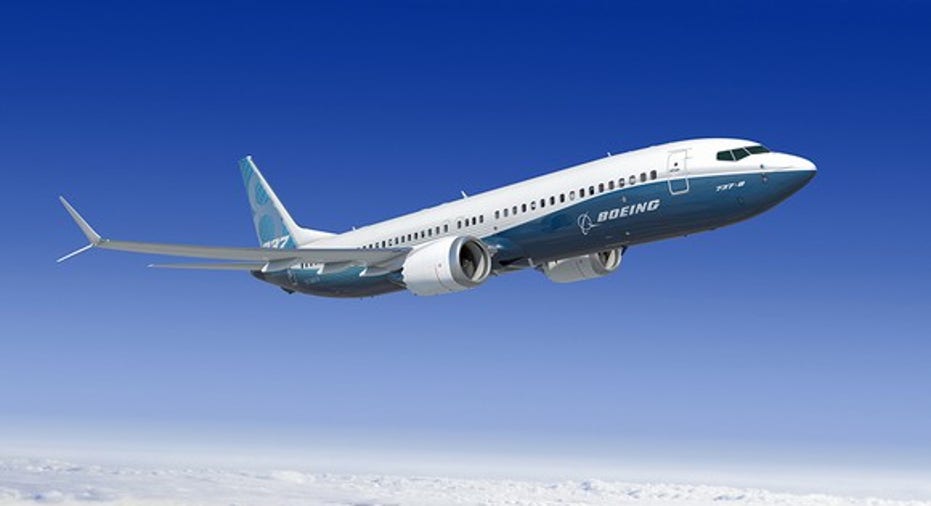Boeing Investors Got Good News and Bad News in May

Boeing has had a rough time in the past year, facing tough questions from investors about its growth plans, accounting practices, and a series of writedowns.
That trend continued in May as Boeing announced a delay in the delivery schedule for the KC-46 aerial refueling tanker it's developing for the U.S. Air Force. However, the news wasn't all bad for Boeing last month. The company also landed an impressive order for 100 737 MAX 200 aircraft from Vietnamese budget carrier VietJet Air.
Boeing lands a big 737 order
On May 23, VietJet ordered 100 737 MAX 200s. This was a big coup for Boeing, as VietJet is currently an all-Airbus carrier and already had a substantial order book for A320- and A320neo-family aircraft.
The 737 MAX 200 is a special version of the fast-selling 737 MAX 8 with an extra set of emergency exits. This allows airlines to fit up to 200 seats -- hence the variant's name -- compared to a maximum of 189 on the 737-800 and 737 MAX 8.
The 737 MAX 200 is a modified version of the quick-selling 737 MAX 8. Image source: Boeing.
Boeing developed the 737 MAX 200 at the behest of Ryanair , one of its biggest customers. Ryanair expects the new planes to be 18% more fuel efficient than its fleet of 737-800s. In all likelihood, the MAX 200 will become the backbone of Ryanair's fleet over the next 15 years or so.
However, up until last month, the 737 MAX 200 hadn't gotten traction with any other airlines. Boeing rival Airbus has been much more successful in the ultra-low cost carrier segment, thanks in part to its aggressive pricing tactics. The VietJet order further validates the MAX 200 concept and could help persuade other budget carriers across the world to consider ordering this new variant.
Another tanker problem
However, just a few days after Boeing announced the big VietJet order, it disclosed that the U.S. Air Force had again delayed its decision to approve low-rate production of the KC-46A aerial refueling tanker. Moreover, Boeing now plans to deliver the last of the initial batch of 18 tankers in January 2018, five months later than initially planned.
Even then, the tankers won't be fully operational. The wing aerial refueling pods -- one of several fuel delivery systems included in the KC-46A -- won't be installed until October 2018.
This setback surprised many investors because Boeing executives had stated just a few weeks earlier at an investor conference that the tanker program remained on track. However, given that the Defense Contract Management Agency predicted a seven-month delay in March, this schedule change was reasonably foreseeable.
Boeing CEO Dennis Muilenberg recently said no new issues have come up. Rather, the delay is needed to implement a hardware fix for a previously disclosed refueling issue that came up during flight testing. Nevertheless, incorporating this design change into already-built tankers will probably cause additional cost overruns.
Furthermore, the Air Force recently said it will seek compensation from Boeing, although the KC-46A contract doesn't spell out penalties for any delays. Boeing will probably take a special charge totaling hundreds of millions of dollars in Q2 to reflect this delay and design change.
What does it mean for investors?
For investors, the net effect of these two pieces of news is relatively neutral. While the tanker delay is unfortunate (and probably expensive), it shouldn't have been much of a surprise.
If Boeing's design fix for the refueling system works as expected, the company should be able to get the tanker program back on track by 2018. Over the long term, the tanker program could generate over $100 billion in revenue for Boeing, including follow-on orders from the U.S. and foreign militaries, as well as high-margin support and service contracts. That would make the program very profitable despite the early hiccups.
Meanwhile, finding a second major 737 MAX 200 buyer after Ryanair further expands Boeing's backlog for its most important cash cow. And if it can persuade other budget carriers to give the MAX 200 a closer look, the upside for Boeing could be even greater.
The article Boeing Investors Got Good News and Bad News in May originally appeared on Fool.com.
Adam Levine-Weinberg owns shares of The Boeing Company. The Motley Fool has no position in any of the stocks mentioned. Try any of our Foolish newsletter services free for 30 days. We Fools may not all hold the same opinions, but we all believe that considering a diverse range of insights makes us better investors. The Motley Fool has a disclosure policy.
Copyright 1995 - 2016 The Motley Fool, LLC. All rights reserved. The Motley Fool has a disclosure policy.



















